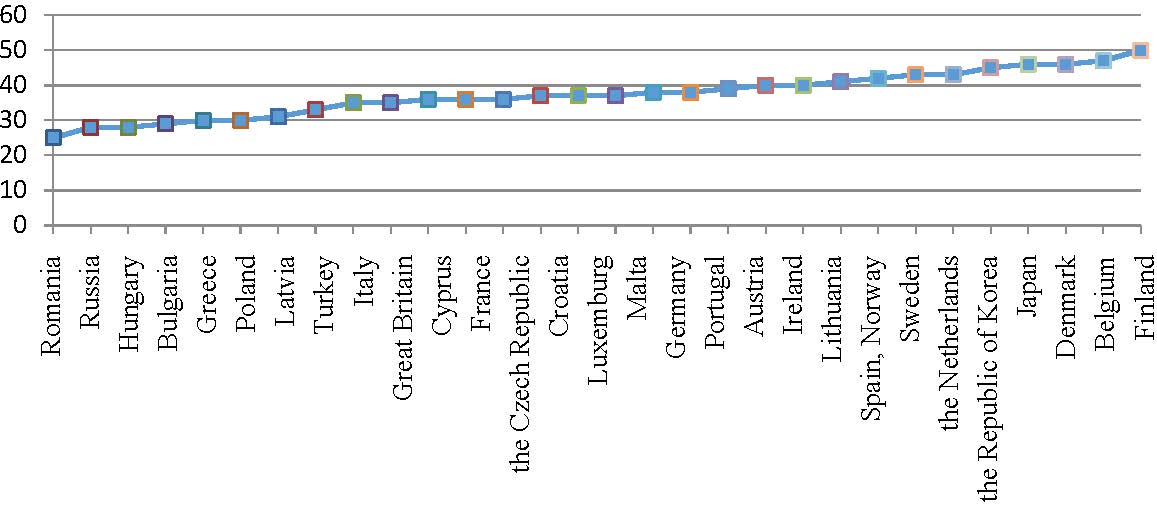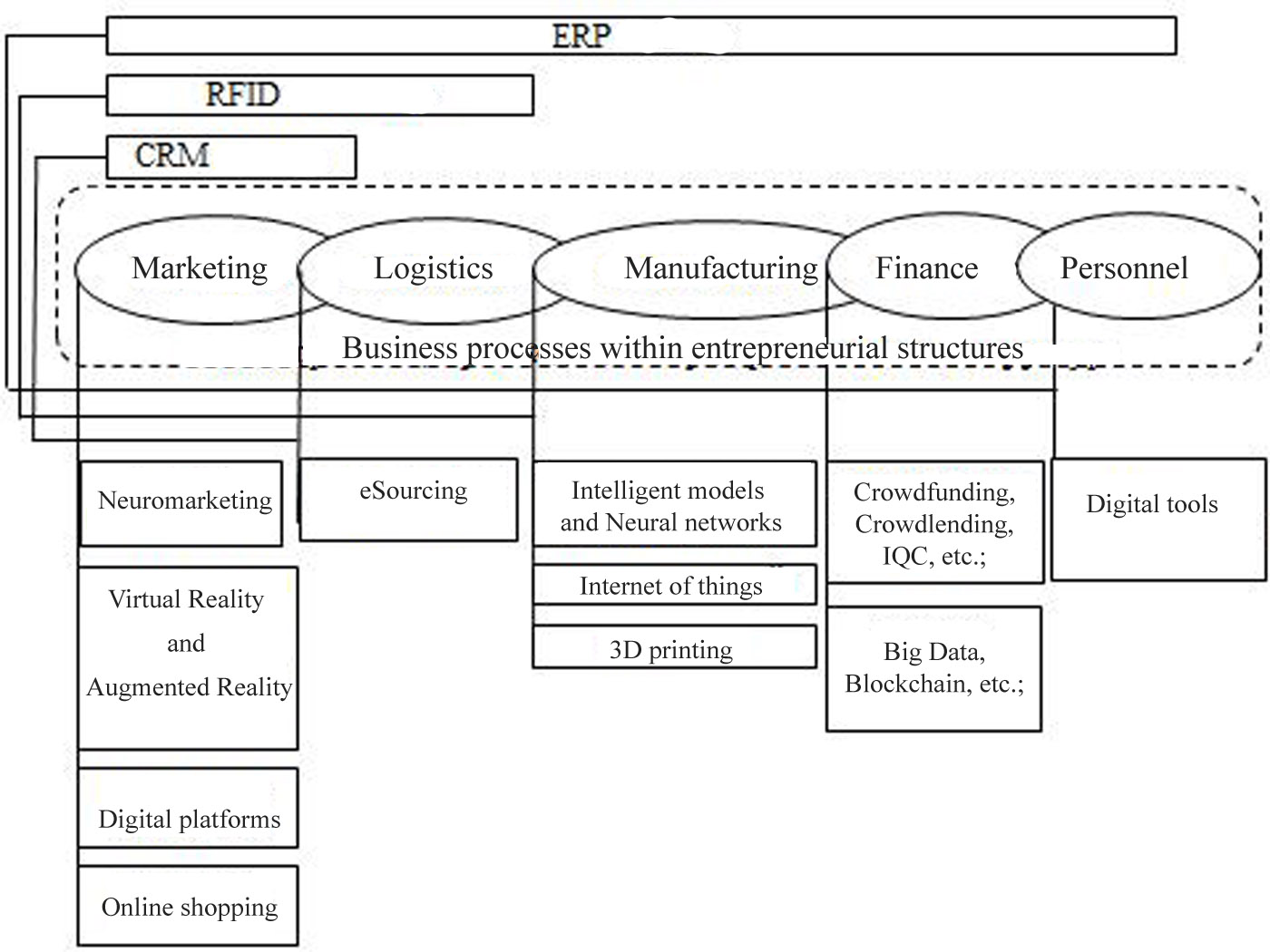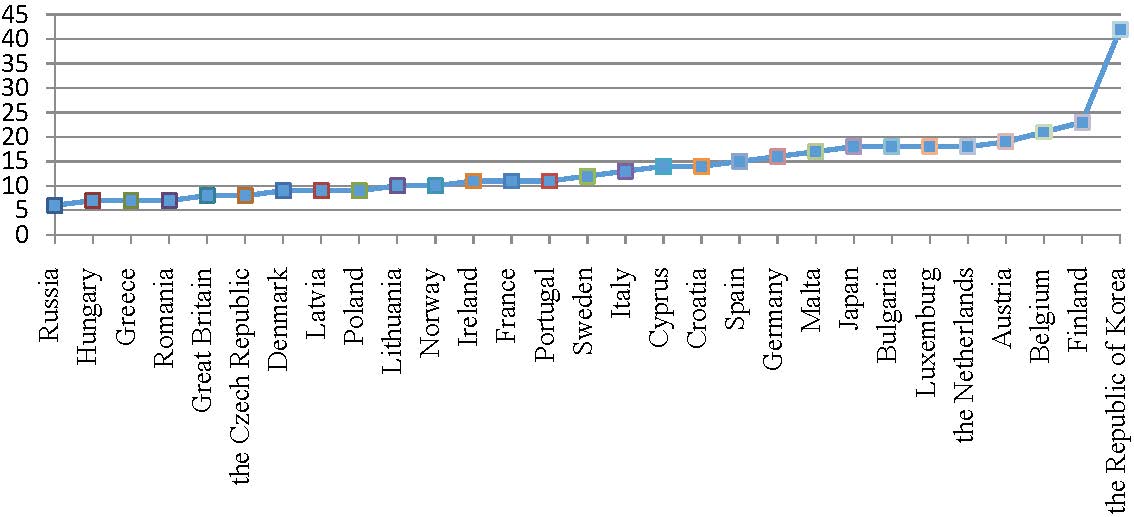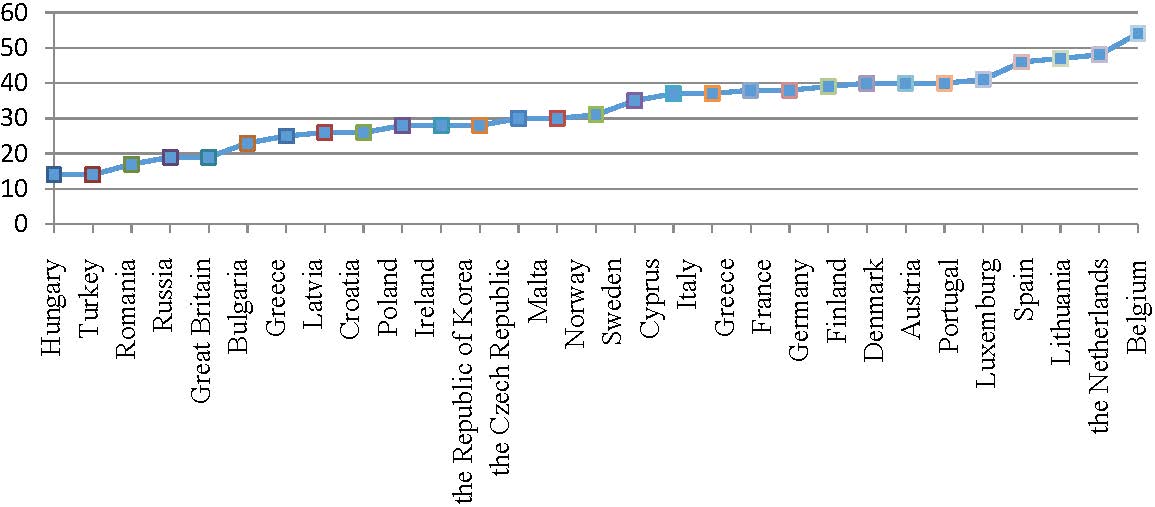Abstract
The paper analyzes major trends in transformation of the business sector in the epoch of digitalization. A study refers to digital transformation of the business sector as a transformation of business models and processes by way of integrating highly innovative (information) technology into their activities, which provide, as correlated with a specific type of corporate activity, customization of the processes to arise. Through a number of indicators characterizing digitalization of the business sector, the paper evaluates the intensity and scope of digitalization incorporated into entrepreneurial activity in Russia in comparison with some foreign countries. It dwells on the contribution of digital technologies to the country’s GDP; ICT Development Index; business digitalization index; the share of the business sector using broadband Internet; the rate of RFID utilization by the business sector; the rate of ERP utilization by the business sector, etc. In a rapidly changing market situation, one can hardly imagine an entrepreneur who does not rely on digital technologies. A modern business sector is concerned with new business, management and economic approaches. Digital transformation affects all aspects of a company, including marketing, logistics, manufacturing, finance, personnel, etc. The paper explores the main dimensions of digital transformation contributing to business processes. It examines specific activities of companies responsible for the production process. Every process taking place in a company, one way or another, benefits from digitalization. The study demonstrates broad prospects and opportunities for integrating digital technologies, methods, etc. into business models in various sectors of the Russian economy.
Keywords: Business digitalization, digital transformation, Internet of things, online shopping, ERP, RFID
Introduction
The adoption of the Digital Economy of the Russian Federation program in Russia in 2017 kicked off the use of digital technologies in society at large and the business sector in particular. The application of computers and related technology, the Internet, mobile communications, etc. in present-day society, within the activities provided by entrepreneurial structures, is viewed as a natural and essential condition for their functioning. However, a digital breakthrough as such has not yet happened in the Russian Federation. As per the ranking of the digital economy, in particular the ICT Development Index, Russia takes 45th place as of 2019 (Abdrakhmanova et al., 2019).
In 2016, the contribution of digital technologies to Russian GDP accounted for 3.9 %. For comparison, in the USA this figure was 10.9 %, in China – 10 %, in EU countries – 8.2 %, in Brazil – 6.2 %, in India – 5.5 % (Semerina & Somina 2018).
Digitalization brings about the need for business transformation by integrating new business models into its activities, based on the use of artificial intelligence, the industrial Internet of things, 3D technology, and many other digital technologies.
Innovation in doing business, the use of Internet infrastructure in production and economic activities is an unprecedented solution by the largest companies in the USA, Germany, China, South Korea, Singapore, etc. High-tech companies like Apple, Google, Microsoft, Tesla, Samsung, Amazon, etc. occupy leading positions. Digital transformation based on the use of the industrial Internet made it possible to automate and integrate all business processes at such enterprises as Siemens Mitsubishi Electric, Boeing, DuPont, Tesla, and others. However, if an enterprise cannot transform its production processes based on innovative technologies, it cannot compete in the market. Thus, over 500 of global largest corporations constituting the Fortune rating in 2000, having failed to restructure their business models, ceased to function (Krayukhin et al., 2019).
Problem Statement
Transformation of company management systems is indeed topical in the face of drastically changing traditional ideas of doing business related to digitalization processes implemented in all spheres of society, including business activity.
In a rapidly changing market situation, one can hardly imagine an entrepreneur who does not rely on digital technology. A modern business sector is concerned with new business, management and economic approaches. Digital transformation affects all aspects of a company, including marketing, logistics, manufacturing, finance, personnel, etc.
Scientific literature reports some studies related to business transformation in the context of digitalization. These studies are predominantly descriptive and consider either trends in digitalization as a whole (Buntova & Fedulov, 2007; Dimitriadi et al., 2019; Kuzminov et al., 2018), or individual business processes of companies subject to digital transformations (Konovalova & Fomin, 2018; Nagibina & Shchukina, 2017), or its impact on enterprises in various fields of activity (Nikitina & Gavrilova, 2015; Plotnikov, 2018). However, very little attention has been paid yet to the dimensions of digital transformation covering business processes to take place in a company.
The study deals with digital transformation of the business sector as a transformation of business models and processes by way of integrating highly innovative (information) technology into their activities, which provide, as correlated with a specific type of corporate activity, customization of the processes to arise.
Research Questions
Transformation of business processes taking place in business structures in terms of managing various aspects of company’s activities under the influence of digitalization.
Purpose of the Study
The paper aims to address the major trends in transformation of the business sector in the context of digitalization, the intensity and scope of these processes in Russia in comparison with some foreign countries and focus on the dimensions of digital transformation covering business processes to take place in business structures.
Research Methods
Research methods and techniques are based on the analysis and generalization of the studied material on the transformation of various business areas in the context of digitalization, as well as on the systematization and grouping of research findings. The objectives set were achieved based on some general research methods in the framework of comparative, logical, and statistical analysis and graphic interpretation.
Findings
The intensity and scope of digitalization in business was addressed through a comparative analysis of Business Digitalization Index in Russia and some foreign countries (Fig. 1).

Business Digitalization Index (BDI) in Russia makes up 28 %. In contrast, in Japan it is 46 %, in Finland – 50 %, Republic of Korea – 45 %, Lithuania – 40 %. Based on the analysis, out of 30 countries, only Romania (25 %) has BDI lower than Russia.
In 2017, the business sector used broadband Internet only in 81.6 % of cases. In contrast, in Denmark, Finland, the Netherlands, 100 % of organizations use it; in the Republic of Korea, France, Slovenia, Latvia – 99 % of organizations; Austria, Belgium, Spain, Portugal, Czech Republic – 98 %.
A booming digital economy is quickstepping to new business models, requiring company management to transform all business processes to achieve competitiveness in current and future prospects. Business transformation in terms of managing various areas of company’s activities consists in the use of modern digital technologies, tools, etc., that can enhance the competitiveness of business, modify entrepreneurial activity, and set up new forms. Figure 2 shows the dimensions of digital transformation covering business processes to take place in entrepreneurial structures.

A marketing environment for doing business has changed rapidly due to the excess use of information technology, new communications and the requirements of the modern market. The need to change approaches to business administration towards marketing activities is reported by the Association of Internet Trade Companies (AITC): 84 million residents of the Russian Federation are active Internet users, 46.6 % use mobile Internet. The volume of online shopping has increased in Russia and as of 2017 it amounted to about 1.1 trillion rub. (Abdrakhmanova et al., 2019).
In addition, a dynamic spread of information and computer systems and Internet access could not but have an impact on the need to change traditional approaches and tools for demand management and interaction with the consumer. In the present stage of digital environment, behavioral patterns of consumers change, and so do their motives and preferences. Online shopping is an integral part of digital marketing. Ignoring this method of promoting products potentially reduce business income. Today, there is a significant variety of online platforms enabling interaction between business and consumers: megamarkets, aggregator sites, online stores, showcases in social networks, etc.
Online shopping has become an integral part of the economy of almost any country. China is the leader in terms of online shopping capacity – $ 562.7 billion; online shopping is one of the fastest growing areas in the country. In the US, the market capacity is $ 349.1 billion, with 57.4 % of US stores selling online. The third place is taken by the United Kingdom with 93.9 billion dollars, 13 % of the total retail trade is online. Russia is in 9th place in online sales with $ 28.3 billion (Trofimova 2018).
RFID (Radio Frequency IDentification) have long been incorporated into business processes of many companies around the world. The promotion of RFID in the Russian Federation is much worse than in most developed countries. Figure 3 shows the proportion of organizations and RFIDs exploited by entrepreneurs in Russia and some foreign countries. In Russia this indicator amounted to 6 %, whereas in the Republic of Korea about 42 % of enterprises use RFID.

RFIDs are routinely used by companies in logistics, manufacturing, retail, etc. RFIDs in marketing help attract new customers, increase brand loyalty, enhance customer experience, etc.
Another attribute of the digitalization era is virtual (VR) and augmented (AR) reality used in marketing to present product samples to a potential customer.
A modern entrepreneur doing business in the digital economy with a focus on the end consumer makes active use of digital platforms, i.e. sites geared to the seller and the buyer to find each other. Entrepreneurships not represented on such digital platforms lose opportunities to exploit their assets. With the use of digital platforms, the entrepreneur becomes more mobile, has access to the end consumer, and quickly responds to vibrant market situations.
Neuromarketing is a new interdisciplinary field that connects neuroscience, psychology and marketing. It mainly focuses on evaluating consumers’ intellectual and emotional responses to various marketing stimuli (Aishwarya & Malik Ali, 2017). Neuromarketing is attractive for marketers in that it allows them to study consumer requests much more efficiently and faster and to receive hidden information about their customers’ preferences.
Digital transformation affects various areas of business, including logistics. In order to identify goods, logistics labels the cargo and cells in the warehouse: barcodes or radio tags (RFID). This reduces the time for identifying goods upon arrival at the warehouse, since information about it (weight, size, type of cargo, etc.) is automatically entered into the database when the tag is read. Using the same data, in particular weight and size, the warehouse management system distributes the goods around the warehouse.
Nowadays, financial sphere tends to be one of the most susceptible to digital transformation. Modern digital technology affects investment activities (cloud technologies, blockchain, Big Data, etc.). The financial sector steps up crowdfunding, crowdlending, ICO, etc., incorporating them into investment decisions. Some experts announce significantly increasing digital communication channels used in making and implementing investment decisions in various market sectors. Thus, in late 2020, up to 44 % of all investments made are planned through mobile communication channels (Konovalova & Fomin, 2018).
The availability of electronic payments for goods and services also ramps up ongoing processes in the financial sector.
The need for a dramatic change in business administration of production is growing due to cascading dependency of production on the use of digital technology. Digital transformation of production is most clearly seen in specific innovative technologies applied in the production process. Concerning industrial transformation posed by digitalization, standardization and unification is most robust in practical application of the ‘industrial Internet of things’.
In practice, this technology is used to equip production with regulating and measuring devices. These devices are remotely connected to data exchange networks via the Internet and other technologies. Internet of things used in the production process is able to completely computerize and in some cases automate workplaces at the production, after-sales, personnel management levels, etc. In addition, a single information network is created, collecting and processing data on the production process, logistics in production, management processes and other processes in place during production at the enterprise (Dimitriadi et al., 2019; Plotnikov, 2018).
Being incorporated in the industry, IoT has a fairly self-explanatory positive effect. The clearest evidence of this is a growing number of devices connected to it. According to Verizon (as cited in Plotnikov, 2018), in 2014, 1.2 billion devices were connected to IoT globally, and by 2020 this figure is expected to grow to 5.4 billion.
RFIDs are also used in production, in particular, with the aim of accelerating and improving the processes of loading and unloading, automation of interdepartment planning and many other purposes.
Digital transformation is seen in production business process through the application of 3D printing technology. Unlike conventional technologies, it makes it possible, at a very short notice, to produce finished products from a variety of materials. Besides, the technology enables, even at the design stage, to adjust the construction of units and parts, thereby significantly reducing the cost of preproduction.
Currently, there are various methods of 3D printing based on the principle of layer-by-layer creation of a material object: laser stereolithography; mask-image-projection-based stereolithography; PolyJet; selective laser sintering; electron beam melting; lamination; solidification of a material once cooled; polymerization of photopolymer plastic; gluing or sintering; etc. (Nikitina & Gavrilova, 2015).
There is also a variety of tools and methods of the digital economy that comprehensively affect several business processes taking place in an entrepreneurial structure. One of these technologies is ERP. ERP (Enterprise Resource Planning) is a corporate information system designed to automate accounting and management. ERPs are commonly structured around a modular solution and, to one degree or another, cover all the key processes of the company. ERP includes the following set of subsystems: production; supply and marketing; storage; maintenance of equipment and manufactured products, finance, logistics (Buntova & Fedulov, 2007).
There is a great deal of ERPs on the Russian market, including SAP AG, Oracle, Microsoft Business Solutions, Galaktika, Epicor Scala and others. As of 2017 in Russia, 19 % of the business sector used ERPs. This value is significantly lower than in most foreign countries. Figure 4 shows the dynamics of ERPs in Russia in comparison with some other foreign countries.

Transformation of business structures under the influence of digitalization seriously affects the most important business process of any company, referred to as personnel management. According to a study conducted by Deloitte 11, 74 % of more than 7,000 companies in 130 countries around the world deem it important to strengthen HR – Digital. The global market of technical solutions was increasingly invested in the HR area. From 2009 to 2014, 2.3 billion US dollars were attracted (Nagibina & Shchukina, 2017). In the Russian Federation, the HR – Digital area is in its infancy. However, there are many examples of companies from various sectors of the economy that are actively automating HR processes. The most prominent representatives are KFC, Danone, Sberbank, STS Media, Rosatom and others. The example of HR – Digital involve massive online recruiting – based on automatically accumulated statistical pool of the best candidates (social networks), an ideal employee profile is shaped for potential applicants, followed by priority employment conditions; an automated system for employment, time tracking, reporting and payroll; online training on a smartphone, development and career management; labor productivity management using gamification and many others.
Conclusion
A comparative analysis to address the intensity and scope of business transformation in the context of digitalization in Russia and some other countries indicates that there are some serious prospects for further digital transformation of business. The Business Digitalization Index in the Russian Federation in 2017 (28 %) was significantly lower than in most foreign countries. In most foreign countries, the business sector uses broadband internet in more than 90 % of organizations. In Russia, 81.6 % of enterprises used broadband Internet in 2017.
Transformation of the business sector in the context of digitalization is clearly seen in the efforts to incorporate new tools, technologies, methods constituting the ‘digital economy’, etc. in the business processes of companies. All processes occurring within a business can be summarized as marketing, logistics, manufacturing, finance and personnel.
The dimensions of digital business transformation herein relate to the adoption of technologies, methods, tools of the ‘digital economy’ into specific business processes. The study showed broad prospects and opportunities for integrating digital technologies, methods, etc. into business models in various sectors of the Russian economy. It also proved that Russia already has a serious expertise of applying new technologies in business. However, digital transformation is not solely and not so much an investment in new technologies (Internet of things, artificial intelligence, ERP, RFID, etc.), but also a deep, serious transformation of company structure, development strategy, procedures to deal with clients, suppliers, business partners and even with company’s employees.
References
Abdrakhmanova, G. I., Vishnevsky, K. O., & Gokhberg, L. M. (2019). Indicators of the digital economy 2019: statistical collection. National Research University Higher School of Economics. Moscow NRU HSE. https://www.hse.ru/data/2019/06/25/1490054019/ice2019.pdf
Aishwarya, S., & Malik Ali, K. (2017). Neuromarketing and neuroethics – an emerging trend on evaluation of emotional responses of consumers to marketing stimuli. Int. J. of Innovat. Res. in Manag. Studies (IJIRMS), 1(12), 27–30.
Buntova, O. G., & Fedulov, S. V. (2007). Introduction in Enterprise resource planning. SAP, “Galaxy of ERP”. Ural'skij gosudarstv. Univer. im. А.M. Gor'kogo.
Dimitriadi, N. A., Dzhukha, V. M., Mishurova, I. V., & Chernenko, O. B. (2019). Information Component Of The Business Strategy Development By Modern Russian Manufacturing. In 11th International Scientific and Theoretical Conference-Communicative Strategies of Information Society (pp. 68-76). Peter the Great St. Petersburg Polytechnic University.
Konovalova, M. E., & Fomin, E. P. (2018). Features of the development of business sector in the context of the formation of a digital model of the economy. Econ. and Law Issues, 11(125), 51–53.
Krayukhin, G. A., Salimyanova, I. G., & Pogoreltskev, A. S. (2019) Digital transformation – an innovative business model. Probl. of modern econ., 2(70).
Kuzminov, A. N., Dzhukha, V. M., Ternovsky, O. A., & Mikhnenko, T. N. (2018). Cenological Measurement of Productive Efficiency. Europ. Res. Studies J., XXI(Special Issue 3B).
Nagibina, N. I., & Shchukina, A. A. (2017). HR-Digital: Digital Technologies in Human Resource Management. Online magazine Naukovedenie, 9(1). http://naukovedenie.ru/PDF/24EVN117.pdf
Nikitina, L. L., & Gavrilova, O. E. (2015). Prospects for the use of modern 3-D printing in the production of light industry products from polymeric materials. Bull. of the Technol. Univer., 18(7), 224–226.
Plotnikov, V. A. (2018). Digitalization of production: theoretical essence and development prospects in the Russian economy. Bull. of Saint Petersburg State Univer. of Econ., 16–24.
Semerina, S. A., & Somina, I. V. (2018). Digital transformation of business: foreign experience. Samara Univer. Bull. Econ. and Manag., 9(2), 20–25.
Trofimova, V. V. (2018). Development of online shopping in Russia and the world. Busin. Ed. in the knowledge econ., 2, 73–76.
Copyright information

This work is licensed under a Creative Commons Attribution-NonCommercial-NoDerivatives 4.0 International License.
About this article
Publication Date
17 May 2021
Article Doi
eBook ISBN
978-1-80296-106-5
Publisher
European Publisher
Volume
107
Print ISBN (optional)
-
Edition Number
1st Edition
Pages
1-2896
Subjects
Science, philosophy, academic community, scientific progress, education, methodology of science, academic communication
Cite this article as:
Dzhukha, V. M., Klyukovich, Z. A., Sedykh, Y. A., & Mikhnenko, T. N. (2021). Major Trends In Business Transformation In The Epoch Of Digitalization. In D. K. Bataev, S. A. Gapurov, A. D. Osmaev, V. K. Akaev, L. M. Idigova, M. R. Ovhadov, A. R. Salgiriev, & M. M. Betilmerzaeva (Eds.), Knowledge, Man and Civilization - ISCKMC 2020, vol 107. European Proceedings of Social and Behavioural Sciences (pp. 425-433). European Publisher. https://doi.org/10.15405/epsbs.2021.05.57

